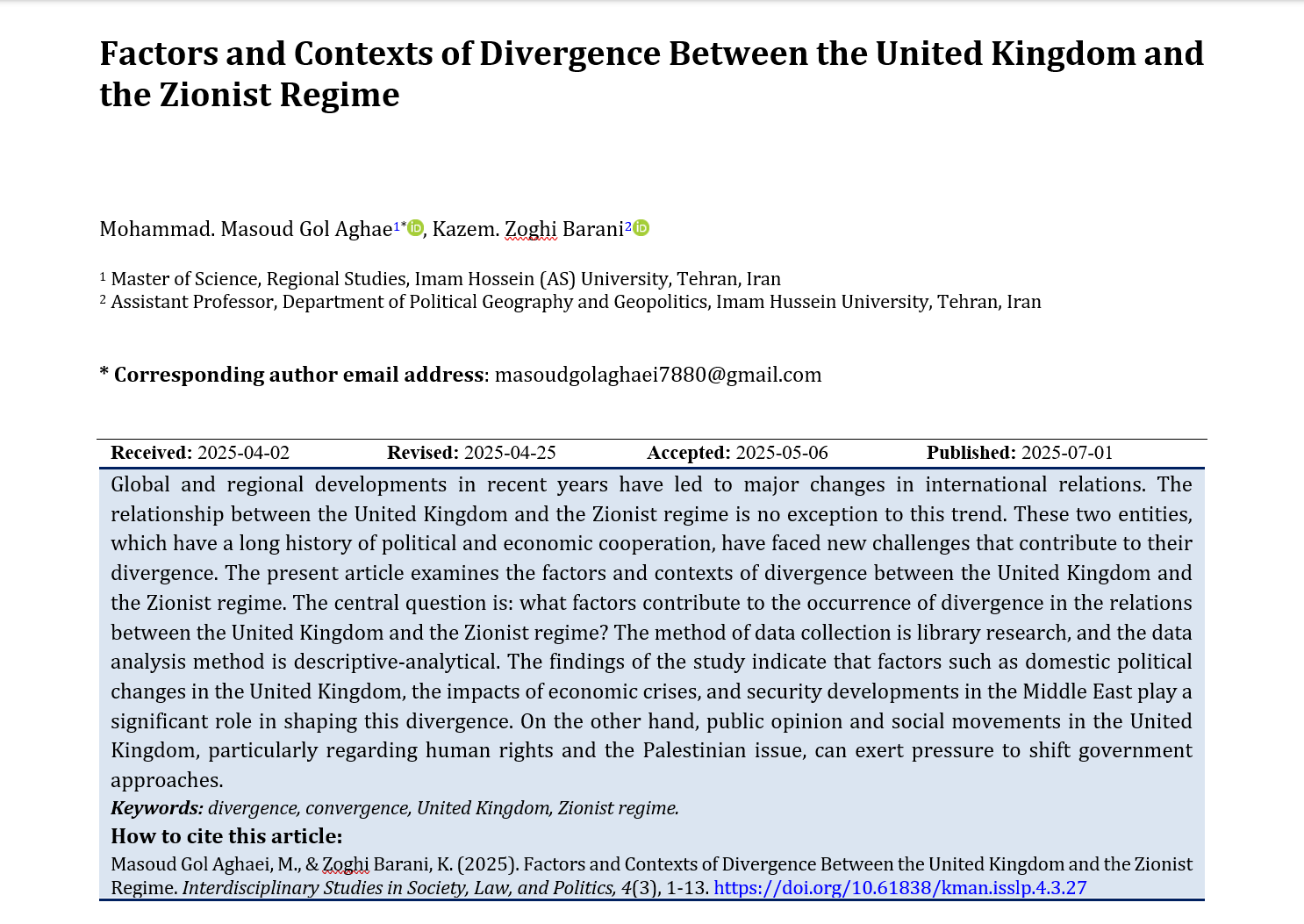Factors and Contexts of Divergence Between the United Kingdom and the Zionist Regime
Keywords:
divergence, convergence, United Kingdom, Zionist regimeAbstract
Global and regional developments in recent years have led to major changes in international relations. The relationship between the United Kingdom and the Zionist regime is no exception to this trend. These two entities, which have a long history of political and economic cooperation, have faced new challenges that contribute to their divergence. The present article examines the factors and contexts of divergence between the United Kingdom and the Zionist regime. The central question is: what factors contribute to the occurrence of divergence in the relations between the United Kingdom and the Zionist regime? The method of data collection is library research, and the data analysis method is descriptive-analytical. The findings of the study indicate that factors such as domestic political changes in the United Kingdom, the impacts of economic crises, and security developments in the Middle East play a significant role in shaping this divergence. On the other hand, public opinion and social movements in the United Kingdom, particularly regarding human rights and the Palestinian issue, can exert pressure to shift government approaches.
Downloads
References
Azghandi, A., & Aghaalikhani, M. (2013). An Examination of Regional Factors of Divergence in Iran-Saudi Arabia Relations (2005-2011). Faslnameh-ye Siasat (Journal of Politics)(2), 2-243.
Garaudy, R., Ajir, H. A., & Sheikhi, H. R. (2006). Les Mythes Fondateurs de la Politique Israélienne (The Founding Myths of Israeli Politics). Mashhad: Gohershad.
Hasbara. (2019). About The Israel Training Program. hasbarafellowships.org
Kamrava. (2020). Iran's Foreign Policy: From Revolutionary Zeal to Realpolitik.
Kardan, D. (2007). Europe 8; Special Issue on the Issues of England. Tehran: Abrār-e Mo'aser.
Major, C., & Von Ondarza, N. (2018). No Global Britain after Brexit.
May. (2016). May's speech to the Conservative Friends of Israel - full text.
McCall, L. A. (1976). Regional Integration a comparison of European and American Dynamics. London, Sage Publications, Berelg Hills.
Mohammadian, A., Naghibzadeh, A., Barzegar, K., & Zakerian, M. (2021). Probable Scenarios in British Middle Eastern Policy in the Post-Brexit Period. Faslnameh-ye Siasat-e Bain-al-Milal (Journal of International Politics), 1(1), 85-107.
Mohammadian, A., Naghibzadeh, A., & Zakerian, M. (2019). British Middle Eastern Policy in the Post-Brexit Period; Case Study: Relations between Britain and Israel. Sal 23, Shomareh 88 (Year 23, Number 88).
Rabbani Khorasgani, Z. (2015). Jews, Zionism, and Europe. Tehran: Markaz-e Asnad-e Enqelab-e Eslami (Islamic Revolution Documents Center).

Downloads
Additional Files
Published
Submitted
Revised
Accepted
Issue
Section
License
Copyright (c) 2025 Mohammad Masoud Gol Aghaei, Kazem Zoghi Barani (Author)

This work is licensed under a Creative Commons Attribution-NonCommercial 4.0 International License.





